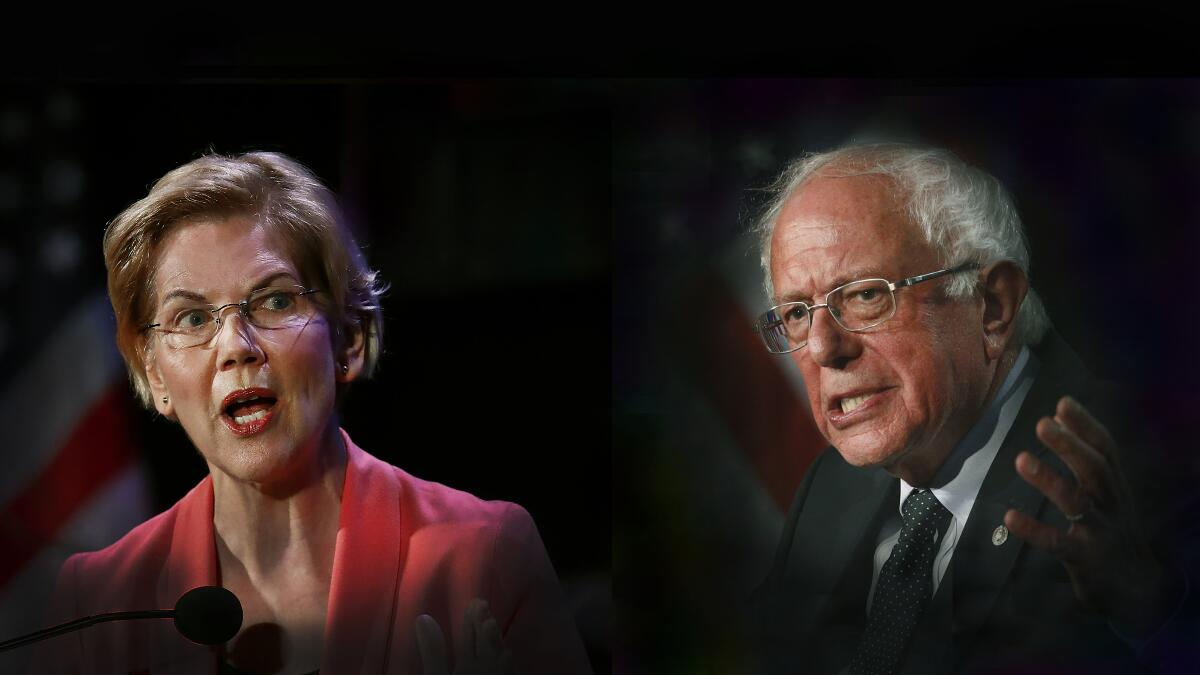Joe Biden is going to have a tough time following the Bernie Sanders and Elizabeth Warren tag team

- Share via
Before Tuesday’s Democratic presidential debate, the first of two this week, one expectation was that it would offer a smackdown between the two progressive populists on the stage: Sens. Bernie Sanders and Elizabeth Warren.
Surprise, surprise: The two senators found themselves as a left-leaning tag team fending off accusations from several rivals that their proposals were extreme, unrealistic and likely to alienate voters Democrats will need to eject Donald Trump from the White House. A face-off between Sanders and Warren for the prize of progressives’ support may lie in the future, but it didn’t materialize Tuesday night in Detroit.
Warren and Sanders made impassioned but often interchangeable comments about economic inequality and corporate privilege and the need for what Warren called “big structural change.” Both attacked Trump, but they made it clear that they thought the country’s sad state preceded Trump’s rise.
And both found themselves on the receiving end of criticism from candidates who cast themselves as more centrist and pragmatic: Sen. Amy Klobuchar of Minnesota, former Colorado Gov. John Hickenlooper, Rep. Tim Ryan of Ohio, former Rep. John Delaney of Maryland and Montana Gov. Steve Bullock. (Mayor Pete Buttigieg of South Bend, Ind., and former Rep. Beto O’Rourke straddled the progressive-centrist divide, and as a result sometimes seemed like bystanders.)
Speaking of surprises, the most effective blows against the Warren-Sanders team were dealt by two candidates regarded as the longest of long shots: Delaney and Ryan.
Delaney suggested that the choice for Democratic voters was between “real solutions” and “impossible promises” such as “Medicare for all.” He suggested that if the party nominated Warren or Sanders, they would face the same fate in the general election as past Democratic losers George McGovern, Walter Mondale and Michael Dukakis.
Ryan suggested that Medicare for all would jeopardize the quality employer-provided health insurance that the United Auto Workers had fought for. He suggested that proposals like decriminalizing illegal entry into the United States — an idea supported by Sanders and Warren — would fall flat with the sort of voters who have to take a shower after a day’s hard work.
Obviously this critique assumes that the Democrats need to appeal to at least some voters who supported Trump in 2016 and are uneasy about “big structural change.”
But Sanders and Warren took a page from Trump’s playbook on another subject: free-trade agreements. It was a reminder that left and right converged on the issue as long ago as the debate over the North American Free Trade Agreement in the early 1990s. Sanders suggested Detroit was destroyed by free trade. Warren said that U.S. trade policy has been written by “giant multinational corporations” with no loyalty to the United States, an anti-corporatist spin on protectionism.
In challenging the progressive pieties of Sanders and Warren, the centrist candidates were in a way acting as a warm-up act for former Vice President Joe Biden, who will participate in Wednesday’s second debate. They may prove to be a tough act for him to follow.
More to Read
A cure for the common opinion
Get thought-provoking perspectives with our weekly newsletter.
You may occasionally receive promotional content from the Los Angeles Times.







